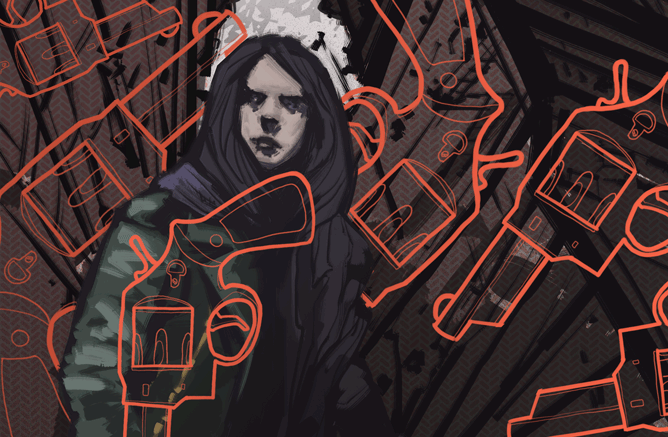On Friday, Nov. 20, the first season of Jessica Jones (based on the comic book character of the same name), a Netflix original series, debuted on the streaming service. However, it doesn’t really feel like the Marvel Television product it is.
Sure, the comic book giant is no stranger to cinema, but upon seeing that trademark bright-red logo during the show’s opening sequence, it was hard not to assume that I was in for something along the lines of the action-packed Agents of S.H.I.E.L.D.
In truth, Jessica Jones has a lot more grit and realism than either title. You won’t see Jessica fighting her way through hordes of alien baddies or web-slinging her way through sarcastic one-liners.
However, you will see her drink alone and contemplate her lot in life. You’ll see her unhappily hook up with a stranger. You’ll see her flash back to the mysterious events that birthed her post-traumatic stress disorder (PTSD) and repeat the same comforting phrase to herself. You’ll see her mess up and hurt people she probably shouldn’t. In short, this series is messy and troubling, and feels all the more realistic for it.
Jessica is a hard-edged antihero running her own private investigation business. She suffers from PTSD and evidently possesses superhuman strength along with an innate sense of deduction.
The show begins with Jessica accepting a case on the disappearance of college athlete Hope Shlottman from concerned parents. As she begins to unravel the case, Jessica discovers a connection between herself, Hope, and mysterious events of her past involving one particular man – the man who kidnapped Hope and has seemingly returned to haunt Jessica again.
Established supporting actor Krysten Ritter (Confessions of a Shopaholic, 27 Dresses) is cast in the leading role, and portrays Jessica magnificently with a deadpan attitude occasionally undercut by emotional, frenetic energy.
Ritter’s portrayal fits perfectly with the show’s film noir-meets-Law & Order: SVU aesthetic and makes Ritter herself reminiscent of a more melancholy Debra Morgan (Dexter, played by Jennifer Carpenter).
Ritter’s supporting cast is, unfortunately, a little uneven. Rachael Taylor (Grey’s Anatomy) plays Jessica’s best friend Trish and Carrie-Anne Moss portrays Jessica’s frequent employer, attorney Jeri Hogarth. Their performances, while well-acted, were marred by stilted, wooden dialogue.
Perhaps Taylor and Moss are simply filling the cookie-cutter roles of sympathetic best friend and over-confident, domineering boss that were provided to them.
Ultimately, Taylor and Moss’s performances are inconsequential. It’s really Jessica’s story, and Ritter is a strong enough actor to drive the plot herself despite a one-dimensional supporting character or two.
Ritter does receive some good support in the form of Mike Colter (Million Dollar Baby), who portrays Luke Cage, a bartender with a connection to Jessica’s past. He first appears in the pilot episode, and though Colter cuts a physically impressive figure, he plays Luke with a reserved, deadpan sadness to match Ritter.
By the second episode, you’ll find out that Luke has powers of his own. This, and Colter’s immediate chemistry with Ritter, indicate that Luke will be sticking around for more than just the beginning of the series. In fact, those who’ve followed Marvel’s cinematic productions thus far ought to get used to Colter’s portrayal of Luke – he’ll be getting his own Netflix series in 2016.
The main antagonist of the show, and arguably its biggest star, has been handled with a tentative air thus far. David Tennant of Doctor Who fame plays the villain Kilgrave and for the first two episodes of the show, and you’ll see no more of him than is absolutely necessary. When he does appear, it’s chilling.
Doctor Who fans will be shocked to hear any trace of levity or cutesy mannerisms gone from Tennant’s voice, replaced with a curt monotone devoid of empathy.
With running themes of sex, abuse, suicide, PTSD, and psychological torture, Jessica Jones is Marvel’s most adult-oriented cinematic foray to date. Primarily thanks to Ritter’s unfalteringly strong performance cast against a film noir aesthetic that epitomizes the detective genre without parodying it. They pull it off beautifully.



